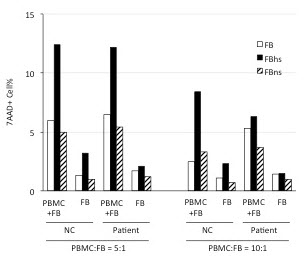Clinical and Immunologic Assessments of Immune Responses in a Liver Transplant Patient with CD40L Deficiency and Hyper IgM Syndrome.
1Comprehensive Transplant Center, Cedars-Sinai Medical Center, Los Angeles, CA
2Pediatrics & Immunology, UCLA, Los Angeles, CA.
Meeting: 2016 American Transplant Congress
Abstract number: D93
Keywords: Co-stimulation, Immunosuppression, IVIG, Natural killer cells
Session Information
Session Name: Poster Session D: Clinical Science: Tolerance: Clinical Studies
Session Type: Poster Session
Date: Tuesday, June 14, 2016
Session Time: 6:00pm-7:00pm
 Presentation Time: 6:00pm-7:00pm
Presentation Time: 6:00pm-7:00pm
Location: Halls C&D
Introduction: Monoclonal antibodies that disrupt CD40/CD40 ligand (CD40L) interactions are likely to have utility in human transplantation. However, the extent of the immunosuppressive effects of CD40/CD40L blockade in humans is unknown. Hyper IgM syndrome (HIGM) is a rare primary immunodeficiency syndrome characterized by defects in the CD40/CD40L pathway, characterized by severe immune deficiency (IgG) and high or normal IgM. Although reported, the effects of CD40L deficiency on T and NK cell function are not established. Patient & Methods: Here, we present a patient with HIGM syndrome who underwent liver transplantation for HCV infection. The patient was maintained on IVIG due to severe IgG deficiency, indicating the profound defect in IgM→IgG class switch. Post-transplant, assessment of NK-cell antibody-dependent cytokine release (g-IFN) to alloantigens and T-cell responses to viral antigens and mitogens were assessed and showed normal CD4+, CD8+ and NK cell responses  . We also examined antibody-dependent cytotoxicity (ADCC) against a CD40 & HLA expressing cell line. Results: These experiments confirmed that the patient's NK cells were equivalent to normals in mediating ADCC (figure 1). In addition, the patient showed normal CD4+ & CD8+ memory T-cell responses to CMV, both before and after transplantation. The post-transplant course has been uneventful with serial biopsies showing no allograft rejection and resolution of HCV infection. The patient is maintained only on low dose TAC. Summary: Taken together, these data suggest that absence of CD40L expression is responsible for aberrant B-cell immunity, but has little impact on NK and T-cell immune responses in vitro. These observations may have implications for use of anti-CD40/CD40L antibodies in transplantation. This also suggests blockade of CD40/CD40L interactions may be important in preventing HLA-sensitization and DSA development.
. We also examined antibody-dependent cytotoxicity (ADCC) against a CD40 & HLA expressing cell line. Results: These experiments confirmed that the patient's NK cells were equivalent to normals in mediating ADCC (figure 1). In addition, the patient showed normal CD4+ & CD8+ memory T-cell responses to CMV, both before and after transplantation. The post-transplant course has been uneventful with serial biopsies showing no allograft rejection and resolution of HCV infection. The patient is maintained only on low dose TAC. Summary: Taken together, these data suggest that absence of CD40L expression is responsible for aberrant B-cell immunity, but has little impact on NK and T-cell immune responses in vitro. These observations may have implications for use of anti-CD40/CD40L antibodies in transplantation. This also suggests blockade of CD40/CD40L interactions may be important in preventing HLA-sensitization and DSA development.
CITATION INFORMATION: Tseng M, Ge S, Roberts R, Kuo C, Choi J, Nissen N, Chu M, Kim I, Shin B, Toyoda M, Jordan S. Clinical and Immunologic Assessments of Immune Responses in a Liver Transplant Patient with CD40L Deficiency and Hyper IgM Syndrome. Am J Transplant. 2016;16 (suppl 3).
To cite this abstract in AMA style:
Tseng M, Ge S, Roberts R, Kuo C, Choi J, Nissen N, Chu M, Kim I, Shin B, Toyoda M, Jordan S. Clinical and Immunologic Assessments of Immune Responses in a Liver Transplant Patient with CD40L Deficiency and Hyper IgM Syndrome. [abstract]. Am J Transplant. 2016; 16 (suppl 3). https://atcmeetingabstracts.com/abstract/clinical-and-immunologic-assessments-of-immune-responses-in-a-liver-transplant-patient-with-cd40l-deficiency-and-hyper-igm-syndrome/. Accessed January 16, 2026.« Back to 2016 American Transplant Congress
